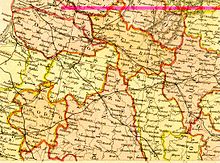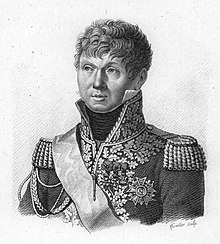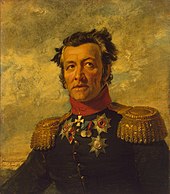Battle of Smoljany
The Battle of Smoljany (formerly Smoljanzy) took place on November 1st July. / November 13, 1812 greg. and November 2nd jul. / November 14, 1812 greg. and was part of the Russian campaign . Russian troops under Count Peter von Wittgenstein threw back the attacking French northern wing under Marshal Victor . In the course of the battle there was heavy fighting around the village of Smoljany, which ultimately fell into Russian hands. The victory created the opportunity for the Russian Northern Army to intervene on the Berezina while Napoleon's retreat .
Mir - Mogilev - Ostrovno - Kobrin - Klyastitsy - Gorodeczno - Smolensk - Polotsk I - Walutino - Borodino - Tschirikovo - Tarutino - Maloyaroslavets - Polotsk II - Vyazma - Lyachovo - Chaschniki - Smoljany - Krasnoi - Beresina
prehistory
The Second Battle of Polotsk on October 20, 1812 turned out to be a failed attempt by the French to secure their northern front along the Daugava line. Marshal Gouvion St. Cyr's defeated troops had been reduced to about 15,000 men who were in full retreat. Napoleon saw the line of retreat of his main army on the eastern border of Belarus threatened and ordered the new commander, Marshal Victor, with 22,000 soldiers to attack Wittgenstein immediately in order to restore the Daugava line.
In the Chashnikov area, the French corps under General Legrand , which had been thrown back from Count Wittgenstein, joined forces with Marshal Victor's advance detachment to make up 36,000 men. Legrand decided to take a defensive position. Wittgenstein had to leave behind a crew of 9,000 men in the reoccupied Polotsk and advanced with about 30,000 soldiers towards the French. After the subsequent victory in the Battle of Tschaschniki (October 31), Wittgenstein sent a division under Major General Harpe to occupy the Vitebsk road junction , where the French military depot was located, on November 7 . The French Daugava line, which secured to the north, had now been broken and the consequences for the main French army were catastrophic. The fall of Vitebsk thwarted Napoleon's plan to shelter his exhausted troops there. Wittgenstein took a position near Tschaschni and limited himself to observing the enemy corps. Napoleon, who feared that Count Wittgenstein's troops would be on the line of retreat of the great army, sent the order from Smolensk to attack Wittgenstein and throw him back to Polotsk. But if the Russians had occupied a strong position, they would bypass it and threaten their line of retreat to the Daugava. On November 11th, Victor and his troops advanced via Tschereja against the Lukomlia; behind it followed the corps under Oudinot. When Count Wittgenstein had received news of the advance of the French, he ordered his vanguard to stop General Alexejew's division at Akentzi and Boiszikowa, while the Helffreich division should concentrate at Maleschkowitschi on Lake Lukoml.
On November 12th, Count von Wittgenstein led his troops to the right bank of the Ulla and ordered General Steinheil's corps near Smoljany and Count Berg's division to take up position near Tschaschniki. At that time, Marshal Nicolas Oudinot had arrived at Victor's headquarters after his wound had healed to take command of the II Army Corps again. In the event that the Russians had occupied a strong position, Napoleon had given instructions to bypass the Russians and cut off their line of retreat to the Daugava.
The battle
On November 13th another battle broke out near Smoljany, a place about 3 kilometers northwest of Orsha on the road to Lepel . The Russians under Wittgenstein had taken up position behind the Lukomlia. At 10 a.m. the French IX. Corps with the 12th Division under General Louis de Partouneaux Wittgenstein's vanguard under General Alexejew at Akentzi. The Russian avant-garde was supported by the troops (Tenginow, Voronezh and Newsk regiments), which the Steinheil Corps sent to aid in good time. After two hours, Alexeyev's troops withdrew, but after the three infantry regiments had arrived to support him, he managed to hold off the French until dark. The French were brought to a halt about 5 kilometers from Smoljany and the Russian troops held the new position until evening. On the same day, an equestrian division under Colonel Fyodor Rüdiger defeated the French at Lukoml and brought in 300 prisoners. The Russian troops had lost about 500 men on these days. During the night Alexejew received further reinforcements under Prince Lev Jaschwyl , who, as senior officer, also took command.
The next day, November 14th, the fight was resumed with an attack by Marshal Victor on the Russian right flank near Smoljany. At 11 o'clock the Girard division, formed from Saxony and Poland, attacked the avant-garde (4 battalions, 4 squadrons and 6 cannons) of Prince Yaschwyl. The infantry regiments of the Russian 14th Division under General Helffreich stood partly on the heights on the right side of the Lukomlia, partly behind it. On the left wing of the infantry, 8 guns covered a height near the Smoljany manor. General Gregor von Berg's division was still on the left side of the Lukomlia. Several squadrons of hussars under Rüdiger covered the main Russian power at Pochawitzi. On the left side of the Lukomlia, under cover of the Voronezh Infantry Regiment, there were other artillery pieces. The French cavalry advancing on the infantry's right flank attacked the Russian left flank. However, she was received with heavy losses by the artillery fire of the Berg division and forced to retreat. The village of Smoljany was attacked five times by the French and then remained in French hands for longer. The strong defensive fire of the Russian artillery disturbed the French columns and forced them to retreat again. After the failure of the attacks on the Russian flanks, Victor decided to attack the center of the enemy position. There was a violent encounter, the village changed hands several times. All Russian troops that were previously on the right side of the river now took part in the fighting. In addition, an additional regiment of the Steinheil Corps was sent from the left bank to provide support. During the last battle, the village of Smoljany finally remained in the hands of the Russians. That evening, the French troops had to withdraw outside the range of the Russian artillery, and the following day Victor withdrew to Tschereja.
consequences
Wittgenstein wanted to await the union with the main power of Kutuzov for further operations and took position at Tschaschniki, he limited himself to the observation of the enemy troops. Wittgenstein considered it necessary to protect his line of retreat to the Daugava and would have retreated even on Orschaer Strasse if Victor had bypassed his left wing. But because Victor feared that he would be pushed to the Daugava and lose the possibility of contact with Napoleon's troops, he stayed at Tschereja until November 22nd.
The Russian division under General Harpe, which rejoined Wittgenstein's troops on November 15, led a new vanguard of about 4,000 men to Akentzi and a detachment of 1,000 men with 2 guns under Lieutenant Colonel Stalypin to Pochawitzi, in order to free Rüdiger, his cavalry was assigned to the avant-garde by Harpe. Stalypin had the connection between the troops Harpe and the detachment under Wlastow to keep that vormarschierte of Luschki by Lepel. To the left of the avant-garde, between Akentzi and the Daugava, stood the Rodionov Cossack regiment, which ensured contact with Harpe's troops and the Vitebsk garrison. So the position of the Russian 1st Army Corps remained until November 22nd, until the time when Oudinot and Victor moved to Orschaer Strasse to cover the front and rear of the remnants of the large army on the Berezina. Despite the victory, Count Wittgenstein had not succeeded in pushing the French troops operating on the Daugava to Vilna , occupying the course of the Ula and opening up communications with Admiral Chichagov, who was on the Beresina. In addition, he could not obstruct the French army on the way to Borisov and had to limit himself to initiating the pursuit. Instead of Wittgenstein and Tschitschagow being able to relocate Napoleon as planned, this was now left to the army of Admiral Tschitschagow alone. Chichagov's vanguard reached Minsk on October 16 and was able to seize the French stockpiles there.
literature
- Alexander Iwanowitsch Michailowski-Danilewski: History of the patriotic war in the year 1812 , volume 4, Edmund Götschel publishing house, Riga and Leipzig 1840, p. 122 f.
- Hanns Eggert Willibald von der Lühe: Militair-Conversations-Lexikon, Volume 7, Adorf 1839, p. 686
- George marquis de Chambray: Napoleon's campaign in Russia 1812 , Volume 2, Duncker and Humblot, 1824, p. 72 f.
- Friedrich Steger: The campaign of 1812 . Chronicle based on contemporary sources (1840), reprinted by Phaidon Verlag, Essen 1985




